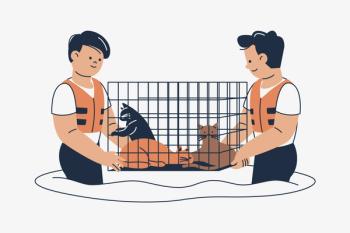
AVMA drafts guidance for breeder bills
Schaumburg, Ill. - The regulation of commercial dog breeders and retailers continues to gather steam, with several state legislatures introducing bills in the past year.
Schaumburg, Ill. — The regulation of commercial dog breeders and retailers continues to gather steam, with several state legislatures introducing bills in the past year. To assist state and local governments in designing effective policies to enforce reasonable welfare standards for breeder and retailer operations, the American Veterinary Medical Association (AVMA) developed model legislation and accompanying regulations, which were approved by the AVMA's Executive Board at its April meeting.
The goal of the AVMA model is to ensure acceptable animal care for the greatest number of dogs not currently covered by the Animal Welfare Act or similar regulations, and to ensure that dogs sold or distributed to the public are protected, irrespective of the type of facility. The model bill applies to high-volume breeders and high-volume retailers, which includes not only pet shops but also animal shelters, Internet distributors and rescues.
According to AVMA's Animal Welfare Division Director Dr. Gail Golab, DVM, MACVSc, the model bill is unique because it provides a basis for which responsible, science-based legislation and regulations can be built.
"Many states have considered passing bills regulating those who breed and/or retail dogs. Unfortunately, existing statutes and proposed bills vary widely in regard to who and what is covered, and in the regulatory rigidity," she explains.
In 2009, legislators introduced more than 90 "puppy mill" bills in 33 states. Indiana, Nebraska, Tennessee, Washington, Wisconsin, Iowa and, most recently, Oklahoma, have passed breeder bills. California Gov. Arnold Schwarzenegger vetoed a similar measure. The District of Columbia authorized its Department of Health to regulate dog breeders, and Illinois appointed a task force to determine whether dog breeder legislation is warranted.
As more bills were introduced, state VMAs sought assistance from the AVMA, which found it was limited in the assistance it could provide without a formal policy addressing what were often very specific issues in the proposed regulations.
"Providing consistency was certainly one consideration as the model was crafted, but we recognize that different states may have different needs. The model bill and regulations are sufficiently flexible to accommodate those differences," Golab says.
The standards established in the model bill are considered to be minimums and should not be interpreted as providing guidance for ideal dog care, AVMA says.
"Dogs that are produced and distributed as pets require a basic standard of care for their own well-being and to ensure, as much as possible, that they possess the temperament and good health necessary to become successful companion animals," she says. "Responsible facilities will readily exceed most, if not all, of the stated standards."
The model bill is notable for the scientific rationale behind the established minimum standards in three key areas: Housing, Behavioral Requirements and Health and Veterinary Care. Unlike some existing and proposed legislation, the AVMA model does not deem who is to sell or raise dogs; use extensive engineering criteria to tell individuals how to raise dogs; or limit the number of animals that can be bred, raised or sold.
"Some bills used arbitrary criteria in saying a facility housing more than 50 dogs couldn't possibly do a good job, which is ridiculous. 'Number of animals' is not an independent variable in the animal welfare equation," Golab says. "You can have a facility with five animals and their welfare may be atrocious, whereas other facilities may be able to manage 100 animals very well. It's about making sure you have appropriate resources, facilities and staff to care for the animals for which you are responsible — regardless of the facility."
To view the model bill and regulations,
Newsletter
From exam room tips to practice management insights, get trusted veterinary news delivered straight to your inbox—subscribe to dvm360.





